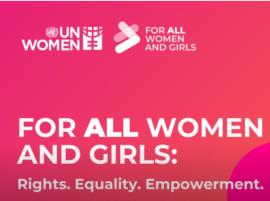
South Africa’s participation at the 69th Session of the United Nations Commission on the Status of Women (CSW69) will underscore the country’s ongoing commitment to ensuring that global gender policies translate into meaningful and tangible change at both regional and national levels.
Minister in the Presidency for Women, Youth and Persons with Disabilities, Sindisiwe Chikunga, will lead the South African delegation to the 69th Session, which will take place at the United Nations Headquarters, in New York, from 10 to 21 March 2025.
Under the chairmanship of Saudi Arabia, the CSW69 will bring together representatives from across the globe to discuss key gender equality issues.
With just five years remaining before the 2030 deadline for the Sustainable Development Goals (SDGs), the international community will evaluate progress made on the Beijing Declaration and Platform for Action ("Beijing +30"), which was adopted at the 1995 World Conference on Women.
Chikunga stressed the importance of South Africa’s participation in such global forums, emphasising that these engagements are vital for shaping policies that affect South African citizens directly.
"South Africa’s presence at CSW69 reinforces our commitment to gender equality and ensures our national interests are reflected in international gender policies and frameworks," the Minister said in a statement on Thursday.
The key Issues South Africa will address at CSW69 include:
• Beijing+30 Report: The Minister will outline the progress made in implementing the Beijing Declaration, challenges encountered, and priority areas requiring urgent intervention to advance gender equality.
• Women’s economic empowerment and leadership: South Africa will advocate for policy interventions that eliminate economic barriers for women, increase access to productive assets, financial resources, and ensure equal participation in all platforms where decisions are made, and power is exercised.
• Gender-based violence and femicide (GBVF): Addressing legislative advancements, law enforcement initiatives, and survivor support programs, while pushing for greater international accountability on gender-based violence.
• South Africa’s role in the G20 Women’s Empowerment Working Group (WEWG): As the Chair of the G20’s Women Empowerment Working Group, Chikunga will use CSW69 as an opportunity to align global priorities with South Africa’s ongoing gender transformation agenda.
• Strengthening International Partnerships: Bilateral meetings with global leaders will be used to forge strategic partnerships aimed at enhancing South Africa’s domestic and international gender policies.
South Africa’s Beijing+30 Report reflects on the strides made in gender equality over the past five years, while also highlighting the key challenges that demand urgent action. Among the key findings include:
• Political representation: South Africa has achieved significant progress in political representation, with women now holding 43.5% of seats in Parliament, occupying 171 out of 400 seats, an increase from 28% in 1994. Women also occupy 42.66% of executive positions in the current administration.
• Education and skills development: Gender parity has been surpassed in higher education, with female students now graduating in larger numbers than their male counterparts in almost every field of study. However, there is still a need for greater representation of young women in Science, Technology, Engineering, and Mathematics (STEM) fields.
• Economic participation: In addition to facing significant wage gaps, women remain underrepresented in patterns of ownership, management, and control of key productive sectors of the economy. The informal sector continues to be a major employer of women, highlighting the need for stronger policies for financial inclusion, access to credit, and workplace protections.
• Gender-based violence and femicide (GBVF): Although legislative and policy improvements have been made, gender-based violence and femicide remains a national crisis. In accordance with the National Strategic Plan (NSP) on GBVF, we are rallying together traditional and religious leaders, educational institutions, stronger implementation of laws, increased funding for survivor support services, and enhanced accountability mechanisms.
• Health and well-being: Maternal health has improved, and access to sexual and reproductive health services has expanded. However, significant disparities remain, especially in rural areas. The report highlights the need for continued efforts to improve healthcare access and promote gender-responsive budgeting. – SAnews.gov.za


